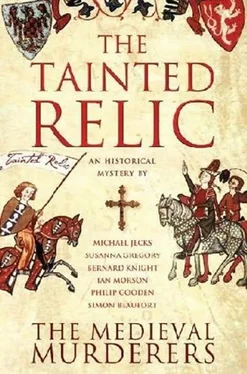The little graves were a sad reminder of those days, he thought, as he looked down at them. On one side was the plain, simple cross of a monk; on the other was the more showy affair with the special sign etched into it.
Joseph rose from his prayers for the two men with a grunt as his knee seemed to lock. The cold wintry weather always had this result: the right knee would freeze, like a rusted hinge, and he would find it difficult to get up from his devotions. Now he must use a stick to hobble from here back to his hospital.
The two men were bold enough, he supposed. It was good of the knight from Furnshill to pay for their gravestones, but perhaps it was the sort of charitable gift a man like him would be expected to donate. Looking after those who had been on a journey and were assaulted on their way. It was a little disturbing to see that cross symbol, though, the mark of the Templars. Their Order had been disbanded because they were heretical and recusants. To have their Order’s cross carved upon the gravestone felt almost sacrilegious-and yet Joseph couldn’t begrudge it. The man himself had seemed a good man. He had saved Andrew’s life, too, and that itself meant he deserved being remembered in a kindly light.
‘Come in, Brother.’
‘Thank you, thank you.’
Joseph hobbled inside and glanced about him at the beds. ‘No customers, thank God.’
Andrew smiled. He was still a little bent from the after-effects of his wound, and the pain, and the reserved inward-looking expression, would never leave him, but he was content. ‘No. No more strays, Brother.’
Joseph watched him from narrowed eyes. Yes, the lad would make a good lay brother. It was a shame that his woman would have to find a new lover, but that was the way of things. Those whom God called, and so on.
And what more clear call could there be, than that he should make a man touch a cursed relic and never be able to leave it behind? The relic was still in its box in Andrew’s custody, secure. There had been a time when Joseph wondered whether it should be given to the bishop, but something made him hesitate. He had spoken to Sir Baldwin at length, and both thought that it would be best to keep the thing secret.
In any case, Andrew had touched the thing once, so he was cursed to keep it. If he relinquished it, he would die.
That was why he was here. He could have left the hospital to marry Annie, but the weight of this burden was too much to lay upon her.
No, rather than blight her life too, he would live here for the rest of his life. Because he knew that if he left the hospital and gave up the relic, he would die. As surely as Will and Adam had died.
At least here he was safe.
Cambridge, late July 1353
The old friar closed his eyes and muttered a prayer of relief when he saw the cluster of towers and rooftops jutting above the distant line of trees. His legs ached with weariness, and there was a bitter, gnawing pain in his back that had been growing steadily worse since Christmas. The summer had been unpleasant for travelling, starting with unseasonable gales and heavy rain, and now there was the exhausting, searing heat that drained his meagre supplies of energy. The sun blazed high in cloudless skies, and even farmers, who usually delighted in dry summers, complained that their crops burned and that the soil was baked too dry and hard. The friar glanced at his companion, an eager, doggedly loyal novice who had agreed to postpone his studies and go with him on his long pilgrimage from their priory in Exeter.
‘It is not much farther now, Father Andrew,’ said the youngster kindly, seeing his master’s exhaustion. ‘We will find a small, quiet hostel, where you can regain your strength. And while you do, I shall attend the public lectures given by the scholars here-if any survived the plague, that is. I heard the Death struck the universities very hard.’
‘It did, Urban,’ replied Andrew, recalling the bleak months some three years before, when a foul contagion had swept across the civilized world, claiming more victims than could be properly buried. ‘It took every one of the Cambridge Dominicans, God rest their souls.’
‘Is this our final destination?’ asked Urban keenly, sensing in his elder a rare willingness to talk, and determined to make the most of it. ‘Is this the end of our quest? Surely I have earned your trust by now, and you can tell me why we left Exeter in the depths of night and have been travelling on little-used pathways for months?’
‘I trust you, Urban,’ replied Andrew, knowing it was time he was honest, but unwilling to impose such a dreary burden on his youthful companion. ‘That is why I asked you to accompany me-you were the novice who best suited my needs. I had intended to end my journey in Norwich, but I grow weaker with each passing day, and I am not sure whether I possess the strength to finish what I began. I may have to ask you to do it.’
‘I will, Father,’ said Urban, supposing the old man was paying him a compliment of sorts. Andrew was not an easy master, and there were times when he felt as though nothing he did was satisfactory. He was always compared unfavourably with another student, who had been everything a novice should be, and Urban often wondered whether he would ever meet Andrew’s exacting standards. ‘I promised obedience, and I will do what is necessary.’
‘It will mean your death,’ said Andrew, watching alarm and then puzzlement flash in the young man’s hazel eyes. ‘Do you remember the rumours about our Holy Blood relic-the one under the high altar? It is said to carry a curse.’
Urban was startled by the mention of so odd a topic, but struggled to mask his reaction: he could not bear Andrew to think him stupid or unworldly. ‘We-the novices-tease each other about it. We take a splinter of wood and thrust it into someone’s hands, telling him he will die now that his bare skin has touched a piece of the True Cross stained with Christ’s blood. It is all nonsense, of course. None of us really believes the story about it being cursed.’
As soon the words were out, Urban regretted them; Andrew was humourless, and would certainly disapprove of jokes about a relic, even one that was tainted with such a dubious reputation. He was unable to suppress the thought that Andrew’s saintly former student would not have made light of such a subject, and that once again he, Urban, would be found lacking. To his surprise, Andrew did not issue a stream of reprimands.
‘I am sure you heard about the Exeter murders,’ Andrew said after a few moments. ‘About how a Keeper of the King’s Peace called Baldwin de Furnshill and his friend Simon Puttock discovered that four robbers had taken hold of the relic? They turned on each other, and three died in horrible ways. Eventually, it came to our priory in Exeter, which was chosen because it lies within the city walls, where it will be safe from thieves.’
Urban nodded slowly, wary now and unwilling to commit himself. He did not want to be accused of listening to the gossip of laymen who said bad things about their priory’s only relic. ‘But I do not believe them.’
Andrew gave the kind of grimace that passed for a smile on his pinched, lined face. ‘I was the fourth thief, the one who survived,’ he said softly. ‘I saw it all. Indeed, the vile events in Devonshire all those years ago were why I gave up my secular life and took the cowl. My brother Rob and I were felons-God save my soul from the shameful iniquities of my youth-and I was rough and feckless. But I came to know the relic’s power, and I wanted to be near it, to ensure it stayed where it was put, and that no one ever tried to steal it for dark purposes.’
Urban gazed at him. Here was part of the story he had not heard before. He had known his master had once been wild-some of the novices even claimed he had been an outlaw-but he had not realized that Andrew had played such an active role in the relic’s history. It certainly explained why he had always spent so much time near the high altar, where the relic was hidden.
Читать дальше












